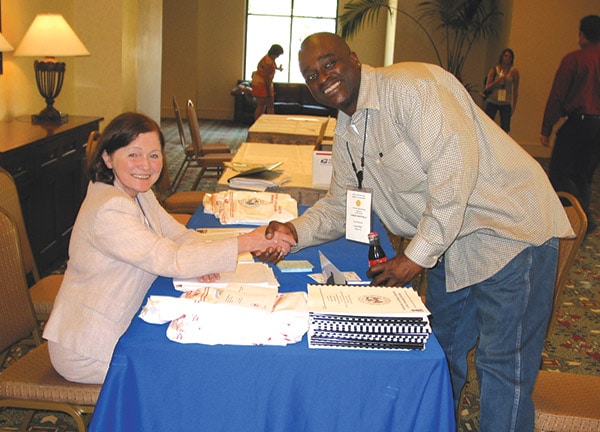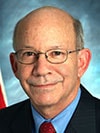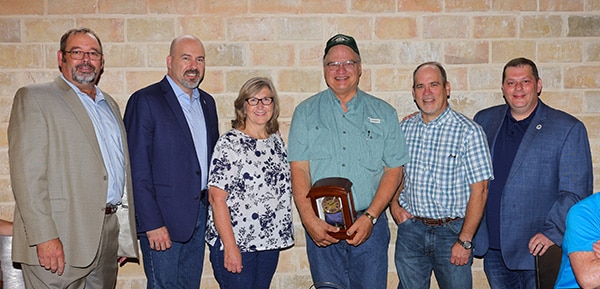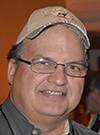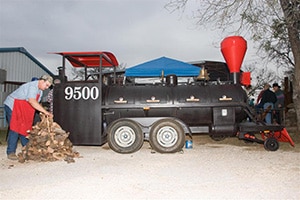An online fundraiser has been established for Eddie Dotson, a member of SMART-TD Local 1545 (Monroe, La.), who was injured June 23, 2021, while on duty in Tioga, La.
Brother Dotson, 52, a trustee for his local and a member of our union for 17 years, lost limbs in the accident. He faces multiple surgeries and mounting medical bills.
His family must drive two hours or stay in a hotel to stay by Brother Dotson’s side as he is being treated in Shreveport, far from his home in Pineville, La.
“Any donations for Brother Dotson and his family would be greatly appreciated,” said Louisiana State Legislative Director Chris Christianson, who established the GoFundMe campaign.
To donate, follow this link.
Author: bnagy
Over the past few years, some law firms who handle mass torts and advertise on a national scale through television and social media have focused their mass marketing on active and retired railroaders who have been afflicted with various forms of cancer and repetitive trauma orthopedic injuries. These firms represent to the public that they are “FELA specialists” with years of experience litigating against the rail industry and, not surprisingly, have generated a substantial client base. Numerous claims have been filed in various courts around the country with an underlying strategy of trying to overwhelm various railroads to the point of forcing settlement of all claims.
But, in reality, the attorneys handling these claims are neither members of ARLA nor railroad union Designated Legal Counsel. A path of destruction has ensued as the railroads have chosen fight over flight in addressing this onslaught of FELA claims. Just a few case examples include:
Holmes v. Union Pacific Railroad, Case No. SC98673 (Mo. 2021) – The Missouri Supreme Court affirmed dismissal of wrongful death FELA cancer case for counsel’s “carelessness, inattention, and deliberate disregard” in failing to timely appoint a personal representative of decedent’s estate as required under the FELA.
Wilant v. BNSF Ry. Co., Case No. N17C-10-365 (Del. Super. 2020) – FELA bladder cancer case dismissed on summary judgment following Daubert ruling striking plaintiff’s general medical causation expert.
Harder v. Union Pacific Railroad, Case No. 8:18-cv-58 (D. Neb. 2020) – Machinist diagnosed with NHL, FELA case dismissed on summary judgment following Daubert ruling striking plaintiff’s medical causation expert.
Kosin v. Union Pacific Railroad, Case No. 4:17-cv-2435 (E.D. Mo. 2019) – FELA bladder, lung and prostate cancer case dismissed on summary judgment as time-barred under FELA 3-year statute of limitations following decision by counsel to withdraw allegations that death was caused by exposures at the railroad.
Collins v. BNSF Ry. Co., Case No. 4:17-cv-3572 (S.D. Tx. 2019) – TY&E employee diagnosed with colon cancer, FELA case dismissed on summary judgment following Daubert ruling striking plaintiff’s industrial hygienist and medical causation experts.
York v. BNSF Ry. Co., Case No. 1:17-cv-1088 (D. Colo. 2019) – TY&E employee diagnosed with bladder cancer, FELA case dismissed on summary judgment following Daubert ruling striking plaintiff’s medical causation expert.
These cases all resulted in court losses for the plaintiffs, families not being made whole and moreover established negative precedents for future cases. The clients in the end sadly paid the price of these so-called FELA “experts” whose advertising presence dwarfed than experience in handling railroad-related cases.
If bringing a case against a carrier, the best and most effective choice is to engage a member of the Academy of Rail Labor Attorneys or a union-endorsed Designated Legal Counsel. They have been vetted by rail labor organizations, have proven experience, follow strict codes of conduct and will commit to giving each and every FELA case the precise focus it deserves while fighting for the best outcome for clients.
A list of SMART-TD Designated Legal Counsel can be found here.
More information about the Academy of Rail Labor Attorneys.
SMART Transportation Division and the Trustees of the Discipline Income Protection Program (DIPP) are pleased to announce a new maximum daily benefit level for program participants beginning Sept. 1, 2021.
Participants will now have the option to elect a $250 daily benefit at a cost of $202.50 per month.
As always, participants in DIPP have the choice to choose the level of protection they want, currently from $6 to $200 per day. The duration of the coverage period (days), ranges from 200 to 365 days and depends on how long a participant has been enrolled in the program. The new maximum daily benefit will provide yet another level of financial protection and peace of mind when a member’s income is at risk. DIPP has a long tradition of shielding SMART-TD members if they are suspended, dismissed or removed from service by the carrier for alleged violation of rules or operating procedures and pays out millions of dollars to participants annually.
If interested in joining DIPP or increasing your existing daily benefit level, TD members should contact their Regional Insurance Manager / Field Supervisor or email DIPP_TD@smart-union.org or write to Discipline Income Protection Program, 24950 Country Club Blvd., Ste. 340, North Olmsted, OH 44070-5333.
For more information on DIPP, visit us on the web at smart-union.org/td/dipp.

If interested, please contact your Regional Insurance Manager / Field Supervisor or email DIPP_TD@smart-union.org for further details.
Railroad Retirement Board (RRB) Labor Member John Bragg announced June 17 that Assistant to the Labor Member Geraldine “Geri” Clark will be retiring July 2 after 51 years with the agency.
“Geri’s retirement is a great loss to my office and the RRB. Her 51 years of dedication to the RRB, rail labor, and to both active and retired rail workers is unmatched. Her self-motivation, commitment to improving customer service and willingness to always go the extra mile when called upon will be greatly missed,” Bragg wrote in a letter announcing Clark’s retirement. “I wish Geri the best as she begins this new chapter in life, but most importantly I want to thank her for her service. She has truly been a pleasure to work with.”
Clark began working at RRB in 1970 and was appointed to her current position in 1985 by former Labor Member of the Board C. J. Chamberlain, becoming the first woman to be named a board assistant in the agency’s history. Geri also served as an assistant to succeeding Labor Members V.M. “Butch” Speakman, Jr. and W.A. “Walt” Barrows.
“Geri’s leaving will mark the end of an era for the Railroad Retirement Board, and I am indebted to her dedication and commitment to the men and women of the rail industry who keep this country moving,” Bragg wrote. “Her work over the last 51 years has helped assure that railroad workers always receive the benefits they need and deserve.”
During her time in the Office of the Labor Member, Clark was the driving force behind the Informational Conference program. The conferences were introduced by the Labor Member to help educate local rail labor representatives about the benefits available to members and their families under the Railroad Retirement and Railroad Unemployment Insurance Acts. Thousands of representatives attended conferences over the years and achieved a better understanding of the provisions and financing of the Railroad Retirement and unemployment insurance systems, and of the administrative organization of the RRB. In turn, they helped improve the effectiveness of the agency’s benefit program operations by passing on to their fellow railroad employees the information they acquired at the conferences.
She was a frequent guest at numerous UTU/SMART-TD Regional Meetings, sharing her knowledge of the RRB to members on the cusp of retirement or who were just planning ahead.
More recently Clark spearheaded RRB’s Pre-Retirement Seminar program for workers. The seminars have proven to be a popular successor to the informational conferences, offering similar content, but open to rail labor representatives and also railroad employees and their spouses nearing retirement.
The leadership and the whole of SMART Transportation Division thank Geri Clark for her many decades of excellent service in helping to ensure that union members understand and get the RRB benefits to which they are entitled. We wish her a long, happy and healthy retirement!
By voice vote June 10, the U.S. Senate confirmed Nuria Fernandez as the 15th administrator of the Federal Transit Administration (FTA).
Her prior experience includes as general manager/CEO of the Santa Clara Valley Transportation Authority (VTA), chief operating officer of the New York Metropolitan Transportation Authority, and senior VP of design and construction for the Chicago Transit Authority and the Washington Metropolitan Area Transit Authority. She also served as Commissioner for the Chicago Department of Aviation, overseeing O’Hare and Midway airports.
Fernandez served as acting FTA administrator for the Bill Clinton administration in 1997 and is a past chair of the American Public Transportation Association from 2019-20.
“We are one step closer to success,” SMART Transportation Division National Legislative Director Greg Hynes said. “This was a marathon session, but one that had the best possible outcome for our members. We thank the committee members for their work and now turn our focus to getting the legislation’s passage in the full House.”
The bill, H.R. 3684, a five-year, $547 billion surface transportation reauthorization bill, now moves to the full House for consideration after passing the committee 38-26. Two Republicans, Brian Fitzpatrick of Pennsylvania and Jenniffer Gonzalez-Colon of Puerto Rico, voted along with 36 Democrats on the committee to pass the bill.
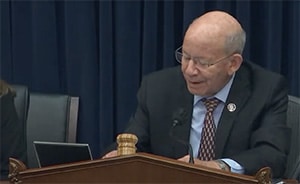
Peter DeFazio, chairman of the U.S. House Transportation and Infrastructure Committee, bangs the gavel after passage of the 2021 INVEST in America Act on June 10. (Screen capture from House T&I Committee YouTube)
“I commend my colleagues for their hard work helping craft these two bills to deliver what Americans expect and deserve: safe roads and bridges, reliable transit options and a robust passenger rail network, wastewater systems that aren’t on the brink of failure, and a commitment to address the existential threat of climate change,” said Chair Peter DeFazio (D-Ore.). “In many ways, the choice couldn’t be easier—because the best part of rebuilding our infrastructure for the modern era is the incredible opportunity for our nation that comes with it. We’re talking millions of good-paying jobs that can’t be exported, real and sustained support for U.S. manufacturing, and the chance to make our nation a world leader once again. This is a once-in-a-generation opportunity that we can’t afford to miss.”
H.R. 3684 contains many provisions important to SMART-TD members.
The bill triples funding for Amtrak to $32 billion, allowing for enhanced service, ADA upgrades, and investments to renew and support service on the Northeast Corridor and long-distance and state-supported routes. Similar to a 2020 version of the bill, provisions of the legislation mandate two-person freight rail crews and take steps to address the problems of bus operator and transit worker assault as well as other issues faced by SMART-TD’s bus, rail and transit members.
Early Thursday, U.S. Rep. Scott Perry of Pennsylvania withdrew Amendment 091 that would have struck the two-person crew freight requirement.
Before his withdrawal, Perry argued in a glitchy video that Positive Train Control and technology made creating a federal crew standard unnecessary.
“It should be one or the other, not all the technology and then also with all the manpower. All it does is add additional cost to the freight rail system and the cost to consumers,” he said before his withdrawal.
The 2022 fiscal year budget proposed by the Biden administration May 28 offers a net increase in funding to the Railroad Retirement Board (RRB) to cover accumulating administrative costs and to improve customer service.
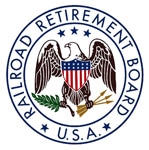
In its budget request to U.S. House leadership and to Vice President Kamala Harris, RRB reported that it has a staffing deficit of 12% from its minimum levels and that the RRB’s programs office has been operating at a reduced capacity because funding for the agency has been nearly flat for five years. Its workforce also is aging, with nearly a quarter of its workers now eligible to retire and 231 employees eligible to retire in the next year.
The added funding will allow RRB to increase its ranks to 801 full-time employees at a time when it needs workers to take care of retirement, survivor claims and numerous other customer-facing duties that had been hampered by the COVID-19 pandemic and chronic understaffing. In its budget request, RRB reported that just 35% of the 1.2 to 1.3 million calls its Bureau of Field Services received were answered in FY2020.
“We are operating in a transitional state that requires a sufficient investment in staffing to sustain benefit determination and payment operations, which still rely heavily on manual processing, while ensuring that the agency retains the knowledge of our laws and systems critical to modernizing benefit payment systems,” the agency stated. “The RRB believes that an increase in staffing is critical to the success of the agency over the next few years.”
The budget request is not the only way the current administration is working to improve RRB.
The agency’s years-long project to upgrade its IT infrastructure finally received full funding through Biden and Congress’s American Rescue Plan. The agency said that the modernization of RRB’s systems should also help to open the door to better service and more efficiency once fully implemented.
“We are grateful to the Congress for providing annual and supplemental appropriations that have fully funded RRB’s IT Modernization program,” RRB stated.
Read the RRB’s budget request and its 2022 Fiscal Year performance plan.
After 44 years with Union Pacific and Missouri Pacific, John Dunn of Local 756, a great advocate for members in the great state of Texas in which he lives, has called it a career.
Dunn joined our union back in November 1977 after hiring on with Missouri Pacific in July 1977.
That began a long association with the union where Brother Dunn served in a number of leadership positions, including six years as a vice general chairperson of GCA-927, 16 years as local chairperson for LCA-927, 13 years as an alternate legislative representative and two years as his San Antonio local’s legislative representative. He served as the assistant Texas state legislative director starting in February 2020, and even had a stint on the SMART-TD Executive Board prior to his retirement, effective May 31, 2021.
“I guess I’m well-known because I’ve represented so many people,” Dunn said when contacted as he drove home from a union meeting at Local 1670 in Laredo, Texas, a mere four days before pulling the pin. “I’ve been doing this for so long … my reputation preceded myself.”
Brother Dunn became an engineer in 1980 and started a notable streak of union activism in 1987 after his uncle, the local delegate, suggested he run for alternate delegate. Dunn ended up attending his first convention in Miami Beach, Fla., to start a streak of nine conventions that “Big Bad John” attended as Local 756’s delegate, taking the time to kick off his opportunities to speak with a reminder to all that he hailed “from the great State of Texas.”
In 1997, Brother Dunn began to get more and more involved in the representational aspect of things by attending regional meetings, getting to know Designated Legal Counsel Steve Young and always looking to educate himself so that he could defend people when targeted for alleged infractions by carriers.
“I was very lucky that they had regional meeting seminars – I went to those,” Dunn said. “A lot of times they were standing room only – there was a wealth of information, and I took tons of notes. All that information is very helpful. There is so much information you can use. Every time you go you can get something new. The guys who are doing it now are doing a phenomenal job. Education is vital to be a successful local chairperson.”
He learned things well, and it got to the point where Dunn even had people from other rail labor organizations asking him to represent them. He also got to see the sore spots where carriers needed to improve their treatment of workers.
“Attendance – railroads are really hitting people on that,” Dunn said. “The railroad wants more and more and more out of their employees.”
Dunn recalled having to defend one worker in a disciplinary hearing for an attendance violation years ago who took time off because his young child had died.
“Things are going to happen to workers’ lives outside of work and there needs to be a change in attitude on the part of the carriers,” he said.
His dependability and advocacy in defending and serving his fellow union brothers and sisters also earned him the respect of his peers.
“John was the go-to guy for everyone in and around San Antonio,” Texas State Legislative Director Kamron Saunders said. “He worked tirelessly for our membership.”
Often, his family life and his union commitments crossed over. His 25th wedding anniversary plans with his wife Lisa were disrupted because Dunn was assigned to investigate a fatality on the Dallas, Garland & Northeastern short line. He also remembered a time when he had his daughter, then seven, sit off to the side while he was engaged in an arbitration hearing. But all these served as signs of his commitment to represent and help his union brothers and sisters to be treated fairly.
In addition to being honored by Local 1670, Brother Dunn’s career also was celebrated May 26 at the Local 756 monthly meeting as more than 50 people, including SMART-TD President Jeremy Ferguson, Vice President Chad Adams, Alt. Vice President Scott Chelette and Saunders, attended the festivities.
“There are so many accomplishments that Brother Dunn achieved throughout the years,” Chelette said. “But his drive, motivation, and caring spirit will be missed the most. For the last 21 years or so, John has went to every ‘new hire’ class held in San Antonio and talked to them about the union and what to expect as a railroader.”
Paving the way for a person new to the railroad industry became a mission of sorts for Dunn – one that made a lasting impression on some. After he announced his retirement, Dunn was approached by a yardmaster who recalled the significant impact Brother Dunn had made by introducing him into the union and taking the time to give him the lay of the land.
“I made it a point to welcome them into the union,” Dunn said. “I wanted to make them aware that we’re here to help them — take them to lunch, give them the contact information that they’d need and they remembered that.”
His advice to the newer generation of railroaders and union members is first to not take things for granted — benefits such as insurance and retirement had to be fought for.
“I’ve always been proud of being a member of this union. Sure there were guys who complained — but where would we be without our union?” Dunn said. “People way before me worked hard and fought hard. People working the road had to pay for their lodging up until 1960. The union got us lodging and meals.”
The new members should be welcomed in, learn the culture and learn the job, Dunn said. By going to meetings they can become comfortable, learn and get involved to strengthen the organization from the local level on up.
“Volunteer to do stuff,” he urged. “You have to have passion, commitment, ownership and believe in what you’re doing. Start off small and attend every union meeting you can. Instead of listening to what’s being said in the crew room, go to the union meeting to be properly informed.”
“The union is able to do what it’s able to do by the strength of its membership. We’re only as strong as our weakest link,” Dunn said.
The strength he added to our organization was celebrated at no fewer than three local union events.
“I am truly humbled by them making the effort to recognize me,” Dunn said. “I have to thank everybody in the locals who have supported me for a number of years and have been so kind in wishing me well. I always refer to them as my ‘railroad family’ — there are a lot of great men and women out there. I’m leaving the railroad, but I’m not leaving them. It’s been a helluva ride — I’ve enjoyed it all.”
Post-retirement, Dunn said he’ll be spending more time with Lisa, his wife of 28 years; his daughter, Mallory, who is attending nursing school on a UTUIA scholarship; and his son, Jake, who is a pipefitting apprentice.
Plans will include traveling and reigniting his hobby of welding — Dunn has constructed a massive barbecue trailer in the shape of a steam engine and also has a computerized plasma cutter he might use to craft with as his wife continues to work a bit longer.
“Godspeed John. We love ya, and will miss you, but wish you well in this next chapter of your life!” Saunders said.
The SMART Transportation Division thanks Brother Dunn for his decades of service and wishes for him and his wife, Lisa, many years of happy and healthy retirement.


